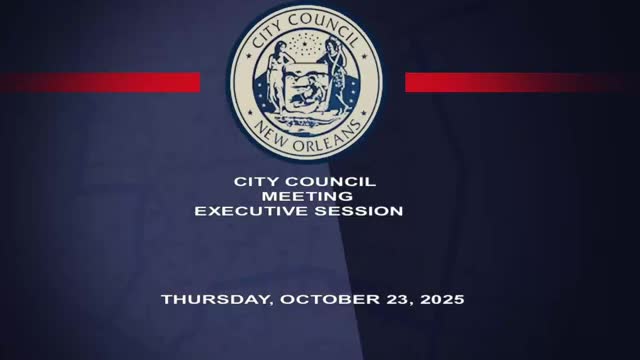City Council directs City Planning Commission to consider interim transient lodging zoning; advocates urge release of study
Get AI-powered insights, summaries, and transcripts
Subscribe
Summary
The New Orleans City Council voted unanimously to direct the City Planning Commission to hold a public hearing on creating a transient lodging interim zoning district that would require conditional-use approvals for hotels, motels, hostels, short-term rentals, commercial timeshares and bed-and-breakfasts.
The New Orleans City Council voted unanimously to direct the City Planning Commission to hold a public hearing on an amendment to the Comprehensive Zoning Ordinance (CZO) that would create a transient lodging interim zoning district (IZD) and subject hotels, motels, hostels, short-term rentals, commercial timeshares and bed-and-breakfasts to conditional-use review.
Council members Phillip Morrell and Jay Harris introduced the motion and an amendment that adds review standards for appeals and technical corrections. The amendment was adopted on a recorded vote noted in the meeting record as “6 yeas, 7 yays, no nays,” and the final motion was approved by voice vote with “7 yeas, no nays.”
The IZD proposal would amend Article 19 of the CZO to require approval of a conditional use for the listed transient lodging uses and would keep other CZO requirements—such as use standards, bulk and yard standards, parking requirements and stormwater management—in force unless an adopting ordinance explicitly changes them.
Supporters at the public-comment period argued that the city needs stronger controls on commercial short-term rentals (CSTRs) to protect residential neighborhoods while opponents and some legal experts urged caution. Monique Blossom of the Louisiana Fair Housing Action Center said, “I am here in support of this IZD because it is much better than the alternative of opening up commercial short term rental permitting and seeing an influx like we saw in District B a couple years ago.”
Nearby neighborhood advocates urged delaying any action until a contracted transient lodging study is publicly released. Council member Morrell urged the City Planning Commission (CPC) to publish the study, saying the council “are united and continuing to strongly encourage the City Planning Commission to publicize the third party transient lodging study to move forward with their staff providing recommendations.” Several speakers noted the study’s release has been delayed for roughly two years and said the CPC staff should make draft results available for public comment.
Opponents said the IZD would add procedural burdens and could be legally vulnerable without the study and more data from the Department of Safety and Permits (DSP). Eleanor Graham, a former deputy city attorney who represents neighborhood associations, told the council the proposal was “legally…untenable” without an adequate evidentiary foundation and asked the council to wait for study results. Lyle Montgomery, a resident who said his neighborhood had suffered high CSTR density, said he was “opposed to the establishment of a new IZD requiring conditional use for transient lodging uses.”
Council members and several advocates also discussed a DSP position that a commercial short-term rental permit creates a vested property right that can be difficult to revoke once issued; that legal interpretation was cited by supporters of the interim measure as a reason to avoid a lapse that could trigger a rapid wave of permit applications. The council asked CPC to publicize the third-party transient lodging study so the public and CPC staff can use it in the conditional-use review process.
The motion directs the City Planning Commission to conduct the public hearing on the proposed amendment; the council approved the referral to CPC and adopted the amendment directing added review standards.
Council and members of the public said they expect the CPC to consider the study, and several speakers pressed for clearer data on enforcement, the number of existing permits and the potential impacts of conditional-use approvals before enacting permanent rules.
